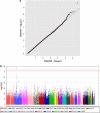Meta-analysis of genome-wide association studies identifies common variants in CTNNA2 associated with excitement-seeking
- PMID: 22833195
- PMCID: PMC3309493
- DOI: 10.1038/tp.2011.42
Meta-analysis of genome-wide association studies identifies common variants in CTNNA2 associated with excitement-seeking
Abstract
The tendency to seek stimulating activities and intense sensations define excitement-seeking, a personality trait akin to some aspects of sensation-seeking. This trait is a central feature of extraversion and is a component of the multifaceted impulsivity construct. Those who score high on measures of excitement-seeking are more likely to smoke, use other drugs, gamble, drive recklessly, have unsafe/unprotected sex and engage in other risky behaviors of clinical and social relevance. To identify common genetic variants associated with the Excitement-Seeking scale of the Revised NEO Personality Inventory, we performed genome-wide association studies in six samples of European ancestry (N=7860), and combined the results in a meta-analysis. We identified a genome-wide significant association between the Excitement-Seeking scale and rs7600563 (P=2 × 10(-8)). This single-nucleotide polymorphism maps within the catenin cadherin-associated protein, alpha 2 (CTNNA2) gene, which encodes for a brain-expressed α-catenin critical for synaptic contact. The effect of rs7600563 was in the same direction in all six samples, but did not replicate in additional samples (N=5105). The results provide insight into the genetics of excitement-seeking and risk-taking, and are relevant to hyperactivity, substance use, antisocial and bipolar disorders.
Figures




Similar articles
-
Single nucleotide polymorphisms in the REG-CTNNA2 region of chromosome 2 and NEIL3 associated with impulsivity in a Native American sample.Genes Brain Behav. 2016 Jul;15(6):568-77. doi: 10.1111/gbb.12297. Epub 2016 Jun 1. Genes Brain Behav. 2016. PMID: 27167163 Free PMC article.
-
Genome-wide association scan of trait depression.Biol Psychiatry. 2010 Nov 1;68(9):811-7. doi: 10.1016/j.biopsych.2010.06.030. Epub 2010 Aug 25. Biol Psychiatry. 2010. PMID: 20800221 Free PMC article.
-
Test for association of common variants in GRM7 with alcohol consumption.Alcohol. 2016 Sep;55:43-50. doi: 10.1016/j.alcohol.2015.10.005. Epub 2016 Aug 31. Alcohol. 2016. PMID: 27788777 Free PMC article.
-
Association of the dopamine D4 receptor (DRD4) gene and approach-related personality traits: meta-analysis and new data.Biol Psychiatry. 2008 Jan 15;63(2):197-206. doi: 10.1016/j.biopsych.2007.04.006. Epub 2007 Jun 15. Biol Psychiatry. 2008. PMID: 17574217 Review.
-
Remarks on the Influence of Mental Cultivation and Mental Excitement upon Health.West J Med Surg. 1845 Apr;3(4):314-330. West J Med Surg. 1845. PMID: 38208960 Free PMC article. Review. No abstract available.
Cited by
-
Dopamine Receptor DRD2 Gene rs1076560, Personality Traits and Anxiety in the Polysubstance Use Disorder.Brain Sci. 2020 Apr 30;10(5):262. doi: 10.3390/brainsci10050262. Brain Sci. 2020. PMID: 32365807 Free PMC article.
-
Genetic, psychosocial, and demographic factors associated with social disinhibition in Mexican-origin youth.Brain Behav. 2014 Jul;4(4):521-30. doi: 10.1002/brb3.236. Epub 2014 May 16. Brain Behav. 2014. PMID: 25161819 Free PMC article.
-
Genetics of biologically based psychological differences.Philos Trans R Soc Lond B Biol Sci. 2018 Apr 19;373(1744):20170162. doi: 10.1098/rstb.2017.0162. Philos Trans R Soc Lond B Biol Sci. 2018. PMID: 29483347 Free PMC article. Review.
-
Substance Use and Attendance Motives of Electronic Dance Music (EDM) Event Attendees: A Survey Study.Int J Environ Res Public Health. 2023 Jan 19;20(3):1821. doi: 10.3390/ijerph20031821. Int J Environ Res Public Health. 2023. PMID: 36767188 Free PMC article.
-
Associations Between the Dopamine D4 Receptor and DAT1 Dopamine Transporter Genes Polymorphisms and Personality Traits in Addicted Patients.Int J Environ Res Public Health. 2018 Sep 21;15(10):2076. doi: 10.3390/ijerph15102076. Int J Environ Res Public Health. 2018. PMID: 30248905 Free PMC article.
References
Publication types
MeSH terms
Substances
Grants and funding
LinkOut - more resources
Full Text Sources
Miscellaneous

